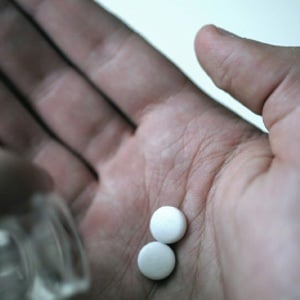
What's more, patients must often try several different SSRI medications, each with a different set of side effects, before finding one that is effective. It takes three to four weeks to see if a particular anti-depressant drug works. Meanwhile, patients and their families continue to suffer.
Now researchers at Tel Aviv University have discovered a gene that may reveal whether people are likely to respond well to SSRI anti-depressants, both generally and in specific formulations. The new biomarker, once it is validated in clinical trials, could be used to create a genetic test, allowing doctors to provide personalised treatment for depression.
Doctoral students Keren Oved and Ayelet Morag led the research under the guidance of Dr David Gurwitz of the Department of Molecular Genetics and Biochemistry at TAU's Sackler Faculty of Medicine and Dr Noam Shomron of the Department of Cell and Developmental Biology at TAU's Sackler Faculty of Medicine and Sagol School of Neuroscience.
Sackler faculty members Prof. Moshe Rehavi of the Department of Physiology and Pharmacology and Dr Metsada Pasmnik-Chor of the Bioinformatics Unit were co-authors of the study, published in Translational Psychology.
"SSRIs only work for about 60% of people with depression," said Dr Gurwitz of the Department of Molecular Genetics and Biochemistry at Tel Aviv University’s Sackler Faculty. "A drug from other families of antidepressants could be effective for some of the others. We are working to move the treatment of depression from a trial-and-error approach to a best-fit, personalised regimen."
Good news for depressed
More than 20 million Americans each year suffer from disabling depression that requires clinical intervention. SSRIs such as Prozac, Zoloft, and Celexa are the newest and the most popular medications for treatment.
They are thought to work by blocking the re-absorption of the neurotransmitter serotonin in the brain, leaving more of it available to help brain cells send and receive chemical signals, thereby boosting mood. It is not currently known why some people respond to SSRIs better than others.
To find genes that may be behind the brain's responsiveness to SSRIs, the researchers first applied the SSRI Paroxetine – brand name Paxil – to 80 sets of cells, or "cell lines", from the National Laboratory for the Genetics of Israeli Populations, a bio bank of genetic information about Israeli citizens.
The TAU researchers then analysed and compared the RNA profiles of the most and least responsive cell lines. A gene called CHL1 was produced at lower levels in the most responsive cell lines and at higher levels in the least responsive cell lines. Using a simple genetic test, doctors could one day use CHL1 as a biomarker to determine whether or not to prescribe SSRIs.
The goal is to end up with a blood test that will allow doctors to tell a patient which drug is best for him or her.
Repair of dysfunctional signalling
The TAU researchers also wanted to understand why CHL1 levels might predict responsiveness to SSRIs. To this end, they applied Paroxetine to human cell lines for three weeks – the time it takes for a clinical response to SSRIs.
They found that Paroxetine caused increased production of the gene ITGB3 – whose protein product is thought to interact with CHL1 to promote the development of new neurons and synapses. The result is the repair of dysfunctional signalling in brain regions controlling mood, which may explain the action of SSRI antidepressants.
This explanation differs from the conventional theory that SSRIs directly relieve depression by inhibiting the re-absorption of the neurotransmitter serotonin in the brain.
Dr Shomron adds that the new explanation resolves the longstanding mystery as to why it takes at least three weeks for SSRIs to ease the symptoms of depression when they begin inhibiting re-absorption after a couple days – the development of neurons and synapses takes weeks, not days.
The TAU researchers are working to confirm their findings on the molecular level and with animal models. Adva Hadar, a master's student in Dr Gurwitz's lab, is using the same approach to find biomarkers for the personalized treatment of Alzheimer's disease.




 Publications
Publications
 Partners
Partners










